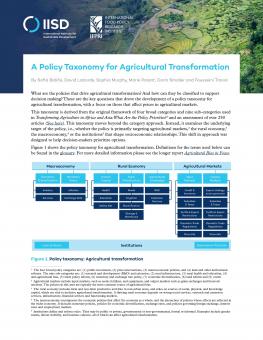
A Policy Taxonomy for Agricultural Transformation
This taxonomy is derived from the original framework of four broad categories and nine sub-categories used in Transforming Agriculture in Africa & Asia: What are the policy priorities?
What are the policies that drive agricultural transformation? And how can they be classified to support decision making? These are the key questions that drove the development of a policy taxonomy for agricultural transformation, with a focus on those that affect prices in agricultural markets.
This taxonomy is derived from the original framework of four broad categories and nine sub-categories used in Transforming Agriculture in Africa and Asia: What Are the Policy Priorities? and an assessment of over 250 articles. This taxonomy moves beyond the category approach. Instead, it examines the underlying target of the policy, i.e., whether the policy is primarily targeting agricultural markets, the rural economy, the macroeconomy, or the institutions that shape socioeconomic relationships. This shift in approach was designed to help decision-makers prioritize options.
For more detailed information please see the longer report Agricultural Bias in Focus.
You might also be interested in
Sustainable Asset Valuation of the Nutrition Sensitive Agriculture Capacity Strengthening Project in Ethiopia
This report analyzes the social, economic, and environmental outcomes of implementing agroforestry and climate-smart agriculture in Ethiopia.
Good COP? Bad COP?: Food systems at COP29
The 29th United Nations Climate Conference (COP 29) in Baku failed to build on the notable progress made on food systems at COP 28. However, it wasn't all doom and gloom.
IISD Trade and Sustainability Review, December 2024
This edition of the IISD Trade and Sustainability Review presents four expert perspectives on how agricultural support and subsidies can promote sustainability in developing and least developed countries.
The Responsible Agricultural Investment Tool for Agribusiness and Case Studies
This report summarizes a collaboration to support agribusinesses in complying with principles of responsible investment in agriculture and food systems.